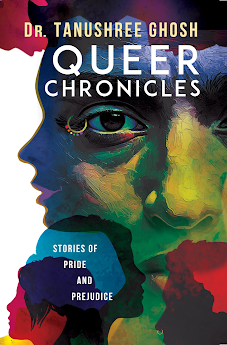QUEER CHRONICLES – STORIES OF PRIDE AND PREJUDICE BY DR. TANUSHREE GHOSH
This collection of short stories by Dr. Tanushree Ghosh begins and ends as an
exercise in subtlety. The themes begin on a serene note and meander onto issues
that are all relatable. India has gradually progressed beyond the taboos that
were linked to homosexuality and diversity in the past, beyond the
criminalisation of the same, though there is room for more scope. There are still myriad
people who have not yet opened their minds to these ideas.
Misconceptions still prevail, and the author tries to
hint at them through her narratives. Sensitive, caring men exist, and they need
not be gay. Since when have qualities like kindness and tenderness been
associated with being gay?
Likewise, group sports like men's hockey have always been
perceived as macho sports. Women hockey players also are aggressive, and it was
a chance statement in the movie 'Chak De' that gave birth to the story titled ‘Hamaari
Hockey Mein’. A main character opines, "Persecution is terrible. The lives
most transgenders have to live is terrible."
Sometimes, a person finds it difficult to fathom his or
her sexuality. As Tanu, the protagonist in 'After the Wedding' summed it up;
"The end of all the confusion and the incessant chatter within." Did
the chatter end or was it just a pause in her present?
Some of the stories leave one with an ache in the heart.
Praneeth and Raja live in their bubble in ‘Love in a Limbo’, till the rhythm
which made their living together breaks down.
"There was silence, not like one after storms. The
silence was the silence inside a storm. The silence in the eye of a
storm."
‘The Wedding Night’ is another such story, where the
helplessness of a character going through her own storm is palpable. It
underlines her dilemma of not being able to exist in her identity, and with no
place to belong.
‘Sulekha & Rukshana’ plays like a familiar litany in my mind as the narrative unfolds, the story of a woman possibly owning her sexuality and making her own choices, a story of power, not acceptance. The motif of power continues in ‘The Mother-in-Law’ where the protagonist refuses to conform to the normal definition of how a woman should behave, a woman who does not care to fit in. Not surprisingly, this nonchalance makes others finally accept her as she is.
It is a credit to the author that she has been able to cover diverse topics which she is passionate about in a manner that brings out the pathos, minus the melodrama. That is exactly why her stories work so effectively.
As Dr. Tanushree Ghosh said in a recent interview, “Stories don’t need to be answers; they just need to be questions.” That is so true, because when questions are asked, they lead to discussions from which answers are born.





These are issues that carry a heavy baggage from the past. I am glad our communities have moved ahead and kept abreast with the time. But like you rightly pointed out there is still some room to cover. I am sure more people will realise (like many have already) that what matters is innate quality of a human being. Everything else from gender and sexual orientation or personal habits and preferrances are secondary.
ReplyDelete-- Pradeep / Time and Tide
This comment has been removed by a blog administrator.
ReplyDeleteGood Information! I really loved your article about the best hospital.
ReplyDeletecutmirchi
qfeast
global
viesearch
goodreads
coursera
devpost
groups